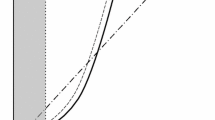Abstract
This paper builds on the assumption that countries behave in such a way as to improve, via their economic strength, the probability that they will attain the hegemonic position on the world stage. The quest for hegemony is modeled as a game, with countries being differentiated initially only by some endowment which yields a pollution free flow of income. A country’s level of pollution is assumed directly related to its economic strength, as measured by its level of production. Two types of countries are distinguished: richly endowed countries, for which the return on their endowment is greater than the return they can expect from winning the hegemony race, and poorly endowed countries, who can expect a greater return from winning the race than from their endowment. The paper analyzes the effect on global pollution of the distribution between the two types of countries and of various measures that change the relative or absolute lot of the poorly endowed.
Similar content being viewed by others
References
Black J (2007) Great powers and the quest for hegemony: the world order since 1500. Routledge, New York
Chombat P (1998) L’Empire des énergivores menace la planète. Lettres du Monde, Paris
Cioffi-Revilla C (1998) Politics and uncertainty: theory, models and applications. Cambridge University Press, Cambridge
Clark I (2009) Bringing hegemony back in: the United States and international order. Int Aff 85:23–36
Dockner E, Jorgensen S, Long NV, Sorger G (2000) Differential games in economics and management science. Cambridge University Press, Cambridge
Elliott M (2007) The Chinese century. Time Magazine, January 11
Huntington S (1993) Why international primacy matters? Int Secur 17:68–83
Ikenberry GJ (2008) The rise of China and the future of the west: can the liberal system survive? Foreign Aff 87:23–37
Kennedy P (1987) The rise and fall of the great powers: economic change and military conflict from 1500 to 2000. Random House, New York
Lee T, Wilde L (1980) Market structure and innovation: a reformulation. Q J Econ 94:429–436
Loury G (1979) Market structure and innovation. Q J Econ 93:395–410
Marburger J (2007) Reflections on the science and policy of energy and climate change. American Geophysical Union Fall Meeting, Union Lecture. http://www.ideasforinnovation.org/co2/related.htm
Modelski G (1987) Long cycles in world politics. University of Washington Press, Seattle
Moldovanu B, Sela A, Shi, X (2007) Contests for status. J Polit Econ 115:338–363
Mosher S (2000) Hegemon: China’s plan to dominate Asia and the world. Encounter Books, San Francisco
Nye JS (1990) Bound to lead: the changing nature of American power. Basic Books, New York
Raupach M, Marland G, Ciais P, Le Quéré C, Canadell JG, Klepper G, Field CB (2007) Global and regional drivers of accelerating CO2 emissions. Proc Natl Acad Sci USA 104:10288–10293
Reinganum J (1982) A dynamic game of R&D: patent protection and competitive behavior. Econometrica 50:671–688
Shenkar O (2005) The Chinese century: the rising Chinese economy and its impact on the global economy, the balance of power, and your job. Wharton School Publishing, Philadelphia
Stern N (2007) The economics of climate change: the Stern review. Cambridge University Press, Cambridge
Thurow L (1993) Head to head: the coming economic battle among Japan, Europe and America. Warner Books, New York
Waltz K (1993) The emerging structure of international politics. Int Secur 18:44–79
Weiss Y, Fershtman C (1980) Social status and economic performance: a survey. Eur Econ Rev 42:801–820
Author information
Authors and Affiliations
Corresponding author
Rights and permissions
About this article
Cite this article
Kakeu, J., Gaudet, G. The Quest for Hegemony Among Countries and Global Pollution. Dyn Games Appl 1, 498–513 (2011). https://doi.org/10.1007/s13235-011-0023-6
Published:
Issue Date:
DOI: https://doi.org/10.1007/s13235-011-0023-6




